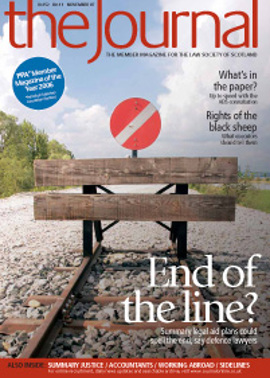Legal rights and the black sheep

Our society is now wealthier, more diverse and much more complex than before. Our profession increasingly encounters clients who are in second or subsequent relationships, having children with previous spouses or partners. Our legal system has always been condemned as being reactive – societal norms change before the laws governing our society change. That is perhaps a matter for jurisprudential debate, but what is not, in my view, is the fact that society, owing to a combination of the foregoing factors, is now more confrontational.
Nihil humani alienum: executry practice is also becoming much more confrontational than before. This, I think, is reflected in the fact that, particularly in England, many firms have now split their executry/probate practice into two different categories – contentious and non-contentious. The expenditure of time and effort in setting up separate departments can only be justified if there is sufficient business to justify it.
England does not “enjoy” the concept of legal rights. As Lord Salvesen once famously (if chauvinistically) stated, in Hutton’s Trustees v Hutton’s Trustees 1916 SC 60: “I regard the right which our law gives to children in their Father’s estate, in common with the laws of most civilised countries excepting England, as a very important check on capricious and unjust treatments”.
Whilst matters in relation to legal rights may well change if the recent proposals of the Scottish Law Commission are adopted by the Scottish Government, for the present we as a profession remain obliged to deal with difficult questions which arise in association with legal rights.
Bones of contention
In particular, there are two matters which appear more regularly to exercise our profession:
The deceased has a “black sheep” child. No benefit has been left to that child in the deceased’s will. The executors and the deceased’s family are insistent that the deceased wished no benefit of any nature to accrue to that child and, as a result, neither executors nor family wish the individual in question to be advised of their entitlement to legal rights.
In similar circumstances, and although the black sheep child may have been advised of their entitlement to legal rights by the executry solicitor, the executors and family are insistent that the child in question should not be afforded a copy of the deceased parent’s will. From the layperson’s point of view, the obvious justification for this is that the black sheep child is not mentioned in the will and therefore has no entitlement to sight of it – pressure may be brought to bear on the executry solicitor on the basis of client confidentiality not to provide a copy, even in the face of a request by the child’s solicitor.
Settled principles
In my view, in relation to both of these awkward matters, the same legal principles apply. There is no doubt but that the obligations incumbent on executors reflect and must instruct our professional practice. It is settled law that executors are obliged to advise all who might have a claim to legal rights of their entitlement. Executors should ensure that potential claimants are aware of their legal rights and what options they may have (Donaldson v Tainsh’s Trustees (1886) 13R 967). Executors are not obliged to encourage a claim to legal rights, and similarly they should not bring pressure on a particular individual not to claim them. Having advised the relevant individuals of their entitlement, the executors should make available to those individuals or their legal agents the information required to enable them to decide whether to claim: Walker v Orr’s Trustees 1958 SLT 220.
The executry solicitor should make clear to executors their duties in that regard – executors should never suppress the existence of the right and must provide a potential claimant with all information required to enable them to decide whether to proceed with the claim. The executors/family may object that the deceased parent did not wish their child to have any right of succession in their estate. Whilst this may indeed have been the case, it may assist the executry solicitor in persuading recalcitrant executors that the wishes of the deceased parent are irrelevant, that legal rights are not, strictly speaking, rights of succession. They are “in the nature of debts which attach to the free succession after the claims of onerous creditors have been satisfied. Hence, it has been frequently said judicially that, in respect of their legal claims, the widow and children are heirs in competition with onerous creditors and are creditors in competition with heirs”: Naismith v Boyes (1899) 1F (HL) 79.
Potential liabilities
Executors may begin to appreciate that by seeking to suppress legal rights, they are placing themselves in a very dangerous situation. Executors are required to settle the debts of the deceased. An executor, if properly advised, would not choose to suppress a debt as this could perhaps lead to personal liability. Executors are therefore obliged to deal in the normal case with a settlement of a deceased’s estate in a well recognised order:
- debts
- legal rights (which are in truth debts if properly viewed)
- specific bequests
- pecuniary legacies
- the residue.
The suggestion of possible personal liability should in most cases be sufficient to persuade executors that they must provide a potential legal rights claimant with full information to enable them to reach a considered decision.
No reason to hide
The second point referred to above (refusing to provide a copy of the parent’s will to a black sheep child who is left no benefit thereunder) appears to be one which still provides difficulty to our profession. Such a refusal can often lead the child to believe (wrongly) that the remainder of the family are conspiring against them improperly, and to further difficulties in the interpersonal relationships of the individuals in question. In my view, there are two very good reasons why the executry solicitor should encourage executors to allow a copy of the relevant will to be supplied to the black sheep child.
The first is that where confirmation is required, the will has to be submitted to the sheriff court in support of the confirmation application. It is recorded in the sheriff court books and at that point becomes a public document – anyone can obtain a copy on payment of the relevant fee. What therefore is the point in refusing to provide a copy of the will to the black sheep child, when it is only a matter of time before they can obtain this for themselves?
There may well be estates in which a will has been left but confirmation is not required because of the size, nature or composition of the deceased’s estate. A classic (perhaps not uncommon) example would be where deceased and spouse held title to their house subject to a survivorship destination (I appreciate that, at present, a dwellinghouse is not subject to a claim for legal rights), and other assets, for example bank accounts, again stood in joint names and to the survivor. However, this does not of itself avoid a claim to legal rights: it is well settled that a bank account held in joint names or survivor is not of itself a gift of the deceased’s interest in the bank account to the survivor (see McCarthy’s Executors v McCafferty 2000 GWD 14-549). In those particular circumstances, executors may insist that no copy of the will should be provided. Is the executors’ attitude justified? The answer to this, I submit, is a clear “No”.
The answer lies in s 13 of the Succession (Scotland) Act 1964. In terms of s 13, an individual who is entitled to claim legal rights is put to an option: unless the will states otherwise, the individual can either claim their entitlement to legal rights or take the benefit left under the will. In effect, this is a statutory form of forfeiture. My point is this: how can a potential claimant properly be expected to exercise the option afforded by s 13 without having sight of the will?
The age of informed consent
It has been suggested to me on more than one occasion that an assurance by the executry solicitor that no benefit has been left in the will should be sufficient for the black sheep child to decide whether or not to claim his entitlement to legal rights. In my view, such an assurance is irrelevant. Given that I consider it to be trite law that executors are required to supply a potential claimant with all information required to enable them to reach a decision, and in particular given that we are now in the age of “informed consent”, I see no point whatsoever in refusing to make a copy of the will available. In my view, such a refusal in relation to a potential legal rights claimant is insupportable in law.
If that rationale is accepted, this of itself should instruct the advice which an executry solicitor should offer to his clients, the executors, i.e. a copy of the will should be made available even to a black sheep potential claimant without placing unnecessary barriers in place – barriers which of themselves will make the potential claimant even more difficult to deal with and may cause unnecessary expense to the estate.
John Kerrigan is a partner in Maxwell Maclaurin, Glasgow
In this issue
- The shape of your future
- The law and the forum
- End of the line?
- Summary justice: the big picture
- Now it's your turn
- Flying south
- Legal rights and the black sheep
- Mediation innovation
- Counting on your CA
- The risk of paper cuts
- Society hits the Net at Murrayfield
- Leading the charge
- Computer says no
- Who, what, where, when, why?
- Getting in on the Act
- Scottish Solicitors' Discipline Tribunal
- Website reviews
- Book reviews
- Well funded work
- PSG offers an offer






